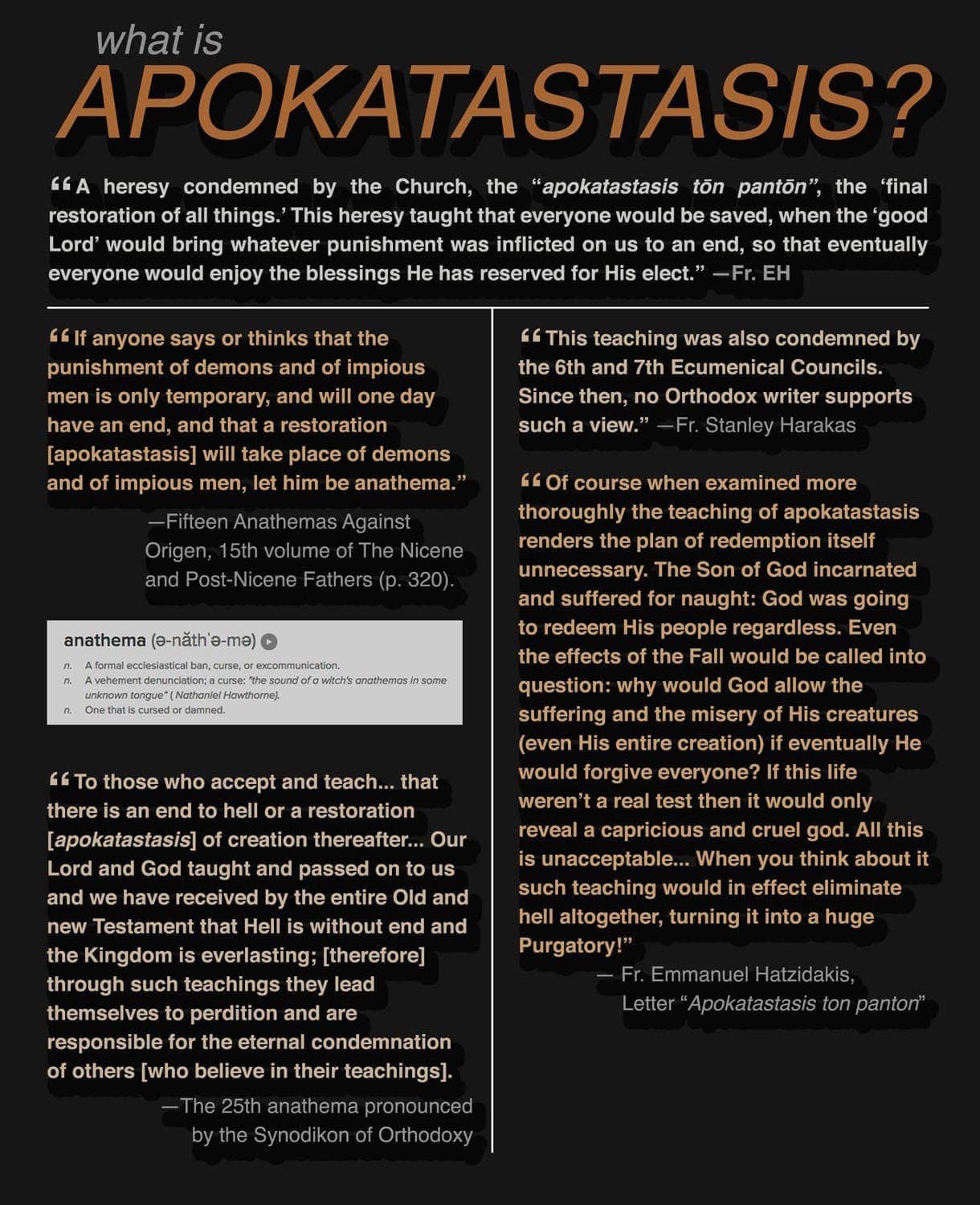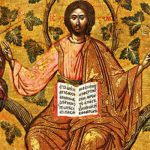
Eternal suffering or eternal rewards
Two Sundays ago we entered the Triodion period, which prepares us for the Great Lent, which prepares us for Holy Week, which prepares us for the Great and Holy Pascha. With the Parable of the Publican and the Pharisee, the Church warned us not to present ourselves as righteous before God, but to humble ourselves before Him and rely on His mercy. With last Sunday’s Parable of the Prodigal Son, the Church again warns us not to be like the older son, but to display true repentance and rely on God’s mercy, love and forgiveness. Today we have a third warning: not to rely on our works, on ourselves, on our means, but to turn to God, now that there is time, to change our lives, and to display our love for our fellow human being, before it is too late.
The purpose of course of the Triodion as a whole is to prepare us for our point of death and for the Great Judgment. This thought should sober us up, and should remind us to watch and pray, to come to our senses, to repent, to change our lives, “while we have time” (Gal. 6:10), “making the most of the time, because the days are evil” (Eph. 5:16), as the Apostle Paul says. The saints meditated constantly upon death, in accordance with the biblical injunction: “In all you do, remember the end of your life, and then you will never sin” (Sir. 7:36). Unfortunately, we don’t want to hear about death, about judgment, about hell. We dismiss them, relying on the goodness of God, on His mercy and forgiveness. But is this wise and prudent?

A heresy condemned by the Church, was that of the ἀποκατάστασς τῶν πάντων, the “final restoration of all things,” that is that everyone would be saved, when the “good Lord” would bring whatever suffering was inflicted on us to an end, so that eventually everyone would enjoy the blessings He has reserved for His elect. Not so, says the Church. Suffering is eternal; it has no end. It will go on and on, forever and ever, unto the interminable ages. No second chances, no going back, no room for repentance and forgiveness. “How can that be?” you ask. “How can good God do such a cruel thing? For a small sin, or for that matter even a great sin, that lasted a short while, to to suffer forever! Even we, as imperfect human beings, are more just than that. One’s suffering is proportionate to his crime. We cause our own punishment: life in prison, a life without end in hell, “the second death” (Rev. 20:6, 21:8)
Yet suffering will not be the same for everyone nor will everyone receive the same reward: “He will render to everyone according to his works” (Rom. 2:6), says the scripture. Elsewhere too the Apostle repeats: “For we must all appear before the judgment seat of Christ, so that each one may receive good or evil, according to what he has done in the body” (2 Cor. 5:10). The Lord also teaches us that not all the souls of the righteous will enjoy the same degree of blessedness: “In my Father’s house there are many rooms” (John 14:2). (Some will occupy the penthouse, others will be accommodated in a garden apartment - but everyone will be happy.) Also the Apostle Paul says: “Star differs from star in glory” (1 Cor. 15:41). Similarly the sinners will not suffer the same way, again according to the words of the Lord: “That servant who knew his master’s will, but did not make ready or act according to his will, shall receive a severe beating. But he who did not know, and did what deserved a beating, shall receive a light beating. Everyone to whom much is given, of him will much be required; and of him to whom men commit much they will demand the more” (Lk. 12:47-48). Also concerning the cities in which the Lord preached and which did not receive Him He said, “it will be more tolerable on the day of judgment” for the land of Tyre, Sidon and Sodom and Gomorrah than for them (Mt. 10:15, 11:21-24).
Who will suffer and who will be rewarded? We’ve already heard St. Paul say that besides murderers and haters of God, many other sinners, including gossipers, deceitful, boastful and disobedient people, “deserve to die” and to be condemned. There are other such lists. In his First Letter to the Corinthians St. Paul says most emphatically: “Do you not know that the unrighteous will not inherit the Kingdom of God? Do not be deceived; neither fornicators, nor idolaters, nor adulterers, nor sexual perverts, nor thieves, nor the greedy, nor drunkards, nor revilers, nor robbers will inherit the Kingdom of God.” (1 Cor. 6:9-10). To the Galatians too he says: “The works of the flesh are plain: fornication, impurity, licentiousness, idolatry, sorcery, enmity, strife, jealousy, anger, selfishness, dissension, party spirit, envy, drunkenness, carousing, and the like. I warn you, as I warned you before, that those who do such things shall not inherit the Kingdom of God” (Gal. 5:19-21. Cf. Eph. 5:3-5, Col. 3:5-10). Also St. John the Theologian in the Book of Revelation writes: “But as for the cowardly, the faithless, the polluted, as for murderers, fornicators, sorcerers, idolaters, and all liars, their lot shall be in the lake that burns with fire and sulfur, which is the second death” (Rev. 21:8).
Now who are those who will inherit life eternal? The Lord said: “Every one who has left houses or brothers or sisters or father or mother or children or lands, for my name’s sake, will receive a hundredfold, and inherit eternal life” (Mt. 19:29), that is all those who renounced the world and followed the Lord. The Apostle Peter in his Second Letter also assures us: “His divine power has granted to us all things that pertain to life... by which He has granted to us His precious and very great promises...”, and then he tells us how to attain them: “Make every effort to supplement your faith with virtue, and virtue with knowledge, and knowledge with self-control, and self-control with steadfastness, and steadfastness with godliness, and godliness with brotherly affection, and brotherly affection with love... so there will be richly provided for you an entrance into the eternal Kingdom of our Lord and Savior Jesus Christ” (2 Pet. 1:5-11).
“Make every effort to supplement your faith with virtue, and virtue with knowledge, and knowledge with self-control, and self-control with steadfastness, and steadfastness with godliness, and godliness with brotherly affection, and brotherly affection with love... so there will be richly provided for you an entrance into the eternal Kingdom of our Lord and Savior Jesus Christ.”
Where do we stand? Do we live a life worthy of reward or of suffering? Let me guess what our answers are to this question. Probably, “I’m not perfect, but nobody is”, or “I do my best”, or “Look, I’m not a criminal”, or “I wouldn’t think I deserve hell”, and the like. How do the Saints answer the same question? In the most characteristic hymn of the entire Triodion period, chanted at every Sunday Orthros Service, we chant: “As I ponder in my wretchedness the many evil things that I have done, I tremble for the fearful day of judgment. But trusting in Your merciful compassion, like David I cry to You: ‘Have mercy on me, O God, in Your great mercy.’” What a beautiful prayer, displaying the correct ethos of an Orthodox Christian. Here is another similar prayer from today’s Orthros Service: “O Lord, supreme in love, as I think upon Your fearful judgment seat and the day of Judgment, I tremble and I am full of fear, for I am accused by my own conscience. [...] Therefore have mercy upon me before the end, and spare me, O most righteous Judge.” (Oikos)


